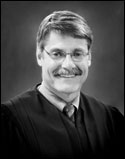Commission seeks to codify how judges handle pro se litigants
By: Eric Heisig//September 18, 2013//
A proposed state Supreme Court rule change aims to give judges guidance on how to handle the increasing number of people who enter the civil court system without a lawyer.
The petition, filed Friday by the state’s Access to Justice Commission, seeks to give judges more leeway to “make reasonable efforts to facilitate the ability of all litigants, including self-represented litigants, to be fairly heard.”
The rule amendment offered a few examples of how a judge could better aid a self-represented litigant if the change is approved, such as explaining the proceedings and legal situations in plain terms, permitting narrative testimony and telling the parties what is expected of them.
According to the petition’s supporting documents, the increasing number of pro se litigants “present challenges to the efficiency and effectiveness of our court system” and “raise significant issues for judges concerning their ethical obligations.”
ATJ Commission President Gregg Moore said the proposed change has been in the works for a few years. The proposal was put together after a subcommittee of 10 circuit court judges, three court commissioners and two Commission members brainstormed options.
The proposed rule change was modeled, at least in part, on an American Bar Association model code that sought to clarify how judges can help self-represented litigants while remaining impartial.
“It is not a violation of this rule,” the ABA’s model code states, “for a judge to make reasonable accommodations to ensure pro se litigants the opportunity to have their matters fairly heard.”
Wisconsin’s proposed rule change further notes “a judge’s exercise of such discretion will not generally raise a reasonable question about the judge’s impartiality.”
Moore said it’s possible the rule change, if accepted, will allow “judges to handle their heavy workloads a little more efficiently.”
“It’s possible,” he said, “that with some clarity of the system, matters might not take as long a time … .”
And it’s possible the petition will codify what a lot of judges are already doing.

Dane County Circuit Judge Richard Niess, who has handled family law cases for about eight years, said about 70 percent of cases before him involve at least one pro se litigant, and about 40 percent involve pro se litigants on both sides. He said he already finds himself doing his best to navigate clients through the system, which the proposal would codify.
Niess said he tries never to cross an ethical line, and often finds himself telling people “I can’t be your lawyer. I can tell you what you need and what resources are available to help you make the decisions yourself.”
“If you’ve got hundreds of these cases every year,” he said, “which we do, it’s very, very difficult, and you have to be careful with these folks.”
The rule petition change is one of several things the commission has in the works. Moore noted the ethical issues surrounding judges and self-represented litigants are not new, but that the commission is “just trying to improve the situation.”
The state Supreme Court’s next rule conference is scheduled for Oct. 25.
Legal News
- Milwaukee’s Common Council now has the most African Americans, women and openly LGBTQ members ever
- Office of School Safety Provides Behavioral and Threat Assessment Management Training Ahead of 25th Anniversary of Columbine Shooting
- Wisconsin Supreme Court to hear arguments in Democratic governor’s suit against GOP-led Legislature
- Lawsuit asks Wisconsin Supreme Court to strike down governor’s 400-year veto
- Wisconsin man pleads not guilty to neglect in disappearance of boy
- ACS Selects University of Wisconsin Law School’s Miriam Seifter for 2024 Ruth Bader Ginsburg Scholar Award
- People with disabilities sue in Wisconsin over lack of electronic absentee ballots
- Wisconsin Republicans ignore governor’s call to spend $125M to combat ‘forever chemicals’
- Native American voices are finally factoring into energy projects
- Steven Avery prosecutor Ken Kratz admits ‘mistakes were made’
- Colombian national extradited to Milwaukee faces International narcotics-trafficking conspiracy charge
- MPD: Milwaukee homicides down nearly 40 percent compared to last year
WLJ People
- Power 30 Personal Injury Attorneys – Russell Nicolet
- Power 30 Personal Injury Attorneys – Benjamin Nicolet
- Power 30 Personal Injury Attorneys – Dustin T. Woehl
- Power 30 Personal Injury Attorneys – Katherine Metzger
- Power 30 Personal Injury Attorneys – Joseph Ryan
- Power 30 Personal Injury Attorneys – James M. Ryan
- Power 30 Personal Injury Attorneys – Dana Wachs
- Power 30 Personal Injury Attorneys – Mark L. Thomsen
- Power 30 Personal Injury Attorneys – Matthew Lein
- Power 30 Personal Injury Attorneys – Jeffrey A. Pitman
- Power 30 Personal Injury Attorneys – William Pemberton
- Power 30 Personal Injury Attorneys – Howard S. Sicula











